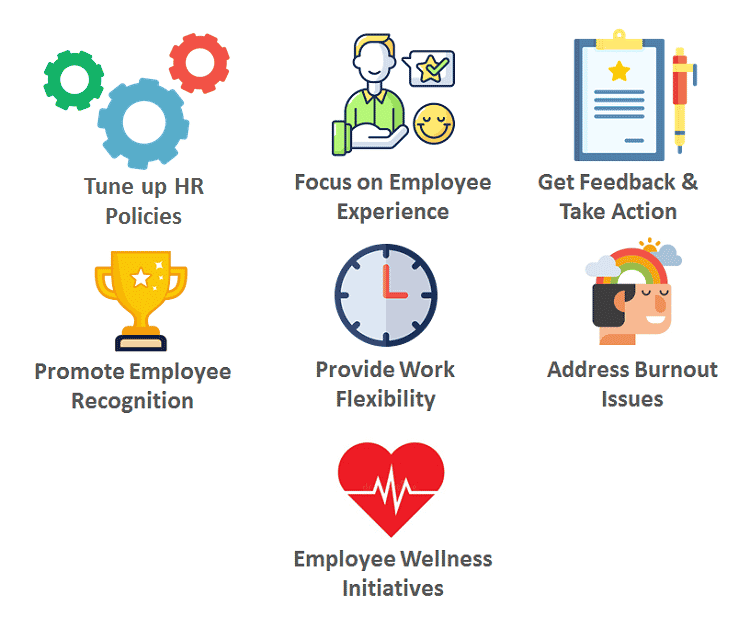1. Revise HR policies and prioritize employee experience by addressing changing needs, providing a safe and growth-oriented work environment, and ensuring open communication to enhance retention.
2. Seek regular feedback and promote recognition by taking meaningful action on employee feedback and implementing spot recognition and appreciation practices to make employees feel valued and motivated.
3. Offer flexibility and address burnout by providing flexible work arrangements, promptly addressing burnout issues, and fostering a positive work culture to improve work-life balance and retention.
4. Enhance employee wellness through wellness initiatives and policies that prioritize health, safety, and well-being, creating a healthy and engaged workforce ready to face business challenges.
Organizations have faced a fierce wave of ‘Great Resignation’ in the past year. Studies suggest that another 41% of the global workforce is considering leaving their jobs by the end of this year. Therefore, it’s high time for organizations to rethink their employee engagement strategies.

Many experts believe that the COVID-19 pandemic proved to be a great awakening for employees across the globe.
The changes forced upon them during the crises made them question what they wanted from their employers.
This includes compensation, benefits, and their day-to-day workplace experience and careers.

Working from home near their loved ones made them realize and reevaluate what they value the most.
Moreover, the response of their employers during the crisis had a significant impact on their decision to stay on.

Most organizations acknowledge the fact that losing employees costs them more than just in financial terms.
When employees quit their jobs, recruiting and training costs are wasted.
It also results in the organization losing the valuable expertise and knowledge gained over the years.

Furthermore, it causes a breakdown in the long-term relationships that these employees may have developed with their customers.
Their departure can negatively impact customers and disturb their relationships with the organization.

Employee retention is essential to build a positive employer brand and attract prospective candidates.
Most importantly the ability to retain their employees helps in maintaining a positive work culture and keeping the workforce motivated.
Employee disengagement or lack of employee engagement is at the core of this problem of ‘Great Resignation’.
Organizations must reconsider their current employee engagement strategies to avoid this.
They need to make them relevant and focused on ensuring workforce retention.
Here are the top 7 employee engagement strategies to improve their retention rates in these challenging times:
1. Tune HR Policies to Meet Changing Employee Needs
2. Prioritize Employee Experience across the Organization
3. Seek Regular Feedback and Take Meaningful Action
4. Promote Spot Recognition and Employee Appreciation Practices
5. Offer Greater Flexibility of Work Timing and Location
6. Address Employee Burnout Issues Promptly
7. Make Efforts to Enhance Employee Wellness


Ensuring employee satisfaction is the key to enhancing retention.
For this, organizations should work proactively towards fulfilling their needs in the changing work environment.
Employee needs have changed significantly over the last two years. Addressing the same in a timely and appropriate manner can help boost retention.
Hence, organizations need to focus on improving the same.
They must develop policies to build a happy, low-stress, and growth-oriented work culture.

Employee experience is another critical factor that impacts retention.
Most talent management gurus believe employees seek safe and secure work environments today.
They want to work where they feel respected and valued for their skills and get ample career growth opportunities.
Organizations need to promote open and hassle-free communication between employees and their supervisors, as well as across teams.
Investing in team-building and user-friendly digital and physical infrastructure, etc., can help improve employee experience.

Most organizations undermine the significance of seeking regular and frequent feedback from their employees,
Taking feedback helps organizations to gain a better understanding of their employees’ needs and issues, and can maximize employee satisfaction.
However, simply taking feedback may prove ineffective if it is not backed up with timely and meaningful action.
Responding to employee feedback appropriately assures them that their views matter to the organization.

Making the employees feel valued and appreciated is essential to boosting retention.
Employee rewards and recognition go a long way in improving employee engagement. It assures them of being an integral part of the organization’s success story.
Promoting spot recognition and employee appreciation assures employees that their efforts will not go unnoticed in the organization.
This recognition, in turn, motivates them to improve their productivity and performance and contribute to the organization’s success.

During the pandemic, remote and hybrid working has gained much popularity.
Providing employees with greater flexibility in terms of work timings and work location ensures greater engagement and satisfaction.
It also helps them improve their work-life balance. It has emerged as a critical criterion for most employees to decide whether to stay or move on.
Investing in the right digital tools and technologies can help promote flexible working and positively impact employee retention.

Overworked employees tend to be highly dissatisfied. They are less likely to work collaboratively with their coworkers.
Moreover, it can negatively impact their efficiency and productivity and reduce their motivation to continue working for the organization.
Addressing employee burnout issues through continual up-skilling and creating a positive and collaborative work culture can help enhance retention.

Organizations need to implement wellness initiatives as an integral part of their employee engagement strategy to ensure better employee retention.
They also need to develop policies that promote health, safety, and well-being, which are the organization’s priorities.
Such wellness initiatives will also likely save on employee expenses and insurance coverage.
It can also help build a healthy, energetic, and productive workforce ready for all business challenges.
Implementing these employee engagement strategies can go a long way in boosting workforce morale and making them feel valued by their employers, resulting in better retention and countering this trend of ‘Great Resignation’.

Lead author: Sagar Chaudhuri, the Co-Founder and CEO of HiFives. He is an HR Tech Evangelist with over 25 years of corporate and entrepreneurship experience. In the past, Sagar has worked in leadership roles with companies such as Genpact, Infosys, and ICICI Bank. He has an engineering degree from IIT Kharagpur and an MBA from IIM Lucknow. Connect on LinkedIn
To stay updated on the latest HiFives blogs, follow us on Twitter (@MyHiFives)